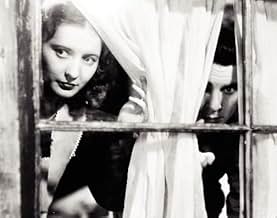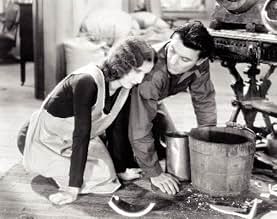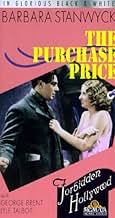Ajouter une intrigue dans votre langueA torch singer becomes a farmer's mail-order bride.A torch singer becomes a farmer's mail-order bride.A torch singer becomes a farmer's mail-order bride.
- Director
- Writers
- Stars
Mae Busch
- Queenie - Girl on Train
- (uncredited)
Nick Copeland
- Skins' Pal at Shivaree
- (uncredited)
Mike Donlin
- Tom Buchanan - Man at Shivaree
- (uncredited)
Harrison Greene
- Man in Hotel Lobby
- (uncredited)
Crauford Kent
- A.C. Peters - The Banker
- (uncredited)
Matt McHugh
- Waco - Fields' Henchman
- (uncredited)
John 'Skins' Miller
- Skins - The Accordion Player
- (uncredited)
Carlyle Moore Jr.
- Hotel Desk Clerk
- (uncredited)
Edmund Mortimer
- Dance Extra
- (uncredited)
Henry Otho
- Extra in Beer Hall and at Shivaree
- (uncredited)
Avis en vedette
This film deals with Stanwyck, who works as a singer in New York. She has been working the nightclub circuit since she was a teenager and is romantically involved with the leader of the underground crime world. Fixture of the pre-code world, Lyle Talbot, portrays the underground kingpin. Because breaking up with such a powerful man, like Talbot, may prove to be difficult, Stanwyck opts to escape to Montreal. In Montreal, she resumes her career under a new name. Stanwyck is spotted by one of Talbot's henchmen. In lieu of returning to Talbot, Stanwyck hatches a scheme with the maid at her apartment building. It seems that the maid has been corresponding with a North Dakota farmer, George Brent, who is looking for a mail order bride. In one of her letters, the maid mails Stanwyck's picture instead of her own, because she finds the youthful Stanwyck more attractive than herself. Sensing the perfect plan, Stanwyck offers to pay the maid two month's worth of wages if she can go to North Dakota in her place. The maid agrees.
Stanwyck and Brent marry and soon it's Stanwyck's turn to learn about life on a farm during the Great Depression. On their wedding night, Brent tries to make advances on new wife Stanwyck to consummate their relationship, but she turns him down and forces him to sleep elsewhere. I know they're married and all, but I don't blame her, she literally just met and married him that same day. I imagine however, that sex probably comes with the territory as a mail order bride. But I digress.
For most of the film, Brent is aloof to Stanwyck and keeps his distance. She genuinely begins to embrace life on the farm and learns how to sew, cook, clean, etc. She is friendly with the neighbors and even helps a neighbor who has recently given birth. Stanwyck helps out with the baby and even instructs a young Anne Shirley how she can help her mother who is recuperating from the birth.
The main conflict in the film, aside from Brent's unhappiness with Stanwyck, is that he is broke and will lose his farm if he cannot pay his back bills. His saving grace however is that he owns a strain of wheat that grows well and is of high quality. He's sure to sell his wheat if he grows and harvests it. Brent and Stanwyck are finally on the same page and work together to save the farm.
This was an okay film, definitely not among one of Stanwyck's best. It definitely doesn't rank up there with my favorite Stanwyck pre-code, Ladies They Talk About. She gives the part her all, even though the plot is somewhat absurd. Brent is just there. He doesn't do much except give Stanwyck the silent treatment. But then this strong silent type was probably Brent's interpretation of a farmer of Scandinavian ancestry living on the Great Plains.
There were definitely some pre-code elements in the film, like Stanwyck walking around the bedroom clad in only a short slip and knee high stockings. She also lays a negligee out on the bed for George Brent to see and get excited, but he's mad at Stanwyck, and won't take the bait.
Stanwyck and Brent marry and soon it's Stanwyck's turn to learn about life on a farm during the Great Depression. On their wedding night, Brent tries to make advances on new wife Stanwyck to consummate their relationship, but she turns him down and forces him to sleep elsewhere. I know they're married and all, but I don't blame her, she literally just met and married him that same day. I imagine however, that sex probably comes with the territory as a mail order bride. But I digress.
For most of the film, Brent is aloof to Stanwyck and keeps his distance. She genuinely begins to embrace life on the farm and learns how to sew, cook, clean, etc. She is friendly with the neighbors and even helps a neighbor who has recently given birth. Stanwyck helps out with the baby and even instructs a young Anne Shirley how she can help her mother who is recuperating from the birth.
The main conflict in the film, aside from Brent's unhappiness with Stanwyck, is that he is broke and will lose his farm if he cannot pay his back bills. His saving grace however is that he owns a strain of wheat that grows well and is of high quality. He's sure to sell his wheat if he grows and harvests it. Brent and Stanwyck are finally on the same page and work together to save the farm.
This was an okay film, definitely not among one of Stanwyck's best. It definitely doesn't rank up there with my favorite Stanwyck pre-code, Ladies They Talk About. She gives the part her all, even though the plot is somewhat absurd. Brent is just there. He doesn't do much except give Stanwyck the silent treatment. But then this strong silent type was probably Brent's interpretation of a farmer of Scandinavian ancestry living on the Great Plains.
There were definitely some pre-code elements in the film, like Stanwyck walking around the bedroom clad in only a short slip and knee high stockings. She also lays a negligee out on the bed for George Brent to see and get excited, but he's mad at Stanwyck, and won't take the bait.
Sometimes I think you just have to be in the mood for certain films. This may have been one of those times. "The Purchase Price" from 1932, largely thanks to Barbara Stanwyck, is actually a very sweet film.
Stanwyck plays Joan, a torch singer, unhappy with her present life and the racketeer, Eddie Fields (Lyle Talbot) with whom she's involved. When she finds out that someone has used her photo and sent it off to be a mail-order bride, Joan decides to show up in person and takes off.
She ends up in farm country with Jim Gilson (George Brent) who's in debt up to his eyebrows. However, over the years, he has developed an excellent grain seed - if he can stave off the creditors until the next planting season, he'll be okay.
To Joan's credit, she settles in, determined to make him a good wife and to be a good neighbor, and she falls in love with Jim. When her ex-beau shows up, Jim jumps to some wrong conclusions.
Barbara Stanwyck is great in this, giving a warm, sincere performance. She is glamorous in the first few scenes (though boy, she can't sing), and she remains sexy and pretty even plainly dressed on the farm, causing a lot of men to notice her and make dumb old Jim jealous.
This is a different kind of role for George Brent, who soon would be well-dressed, mustached, and sophisticated as he played opposite Bette Davis. Here he's an oaf.
The movie is short and moves quickly. Stanwyck's performance helps give a freshness to a story that was old even back in 1932.
Stanwyck plays Joan, a torch singer, unhappy with her present life and the racketeer, Eddie Fields (Lyle Talbot) with whom she's involved. When she finds out that someone has used her photo and sent it off to be a mail-order bride, Joan decides to show up in person and takes off.
She ends up in farm country with Jim Gilson (George Brent) who's in debt up to his eyebrows. However, over the years, he has developed an excellent grain seed - if he can stave off the creditors until the next planting season, he'll be okay.
To Joan's credit, she settles in, determined to make him a good wife and to be a good neighbor, and she falls in love with Jim. When her ex-beau shows up, Jim jumps to some wrong conclusions.
Barbara Stanwyck is great in this, giving a warm, sincere performance. She is glamorous in the first few scenes (though boy, she can't sing), and she remains sexy and pretty even plainly dressed on the farm, causing a lot of men to notice her and make dumb old Jim jealous.
This is a different kind of role for George Brent, who soon would be well-dressed, mustached, and sophisticated as he played opposite Bette Davis. Here he's an oaf.
The movie is short and moves quickly. Stanwyck's performance helps give a freshness to a story that was old even back in 1932.
She may be dressed down for the farm wife's part, but this is Stanwyck at her youthful loveliest. So, can Joan (Stanwyck) adjust to the rigors of rural life after the glamor of big city nightclubs. If you can buy her becoming a mail-order bride as an alternative, you might buy the rest. Seeing her city girl alone on the vast Canadian prairie, suitcase in hand, waiting for her intended, does present a stretch. Nonetheless, now she's got purpose in life, no longer just a meaningless rich man's ornament. I do wish Brent as her mail-order hubby showed a little charm, something that would help us believe she would stick with her new life. Instead, he's overly dour and insensitive, wanting to manhandle her on their wedding night. Getting the two in step with each other makes up the movie's main part.
The movie's quite good at showing the rigors of farm life—the primitive farm house, the constant grubby toil, the relative isolation. I expect Dust Bowl audiences could identify with these demanding aspects, especially when the bank threatens to repossess Jim's (Brent) farm. That Joan manages to stick it out and thrive suggests that behind city decadence lies a common humanity and hidden grit-- a good message for that time and maybe any.
Anyway, pre-Code doesn't disappoint as Stanwyck gets to show off fancy and not-so-fancy underwear. Then too, sleeping arrangements leave little in doubt. Note too, how little is done to prettify either the rough-hewn people or their lives, even though most are stereotypes. Also, I could have done without the barking idiot as comedy relief. All in all, this Warner Bros. antique (1933) remains a fairly interesting little programmer, with a humane underlying message.
The movie's quite good at showing the rigors of farm life—the primitive farm house, the constant grubby toil, the relative isolation. I expect Dust Bowl audiences could identify with these demanding aspects, especially when the bank threatens to repossess Jim's (Brent) farm. That Joan manages to stick it out and thrive suggests that behind city decadence lies a common humanity and hidden grit-- a good message for that time and maybe any.
Anyway, pre-Code doesn't disappoint as Stanwyck gets to show off fancy and not-so-fancy underwear. Then too, sleeping arrangements leave little in doubt. Note too, how little is done to prettify either the rough-hewn people or their lives, even though most are stereotypes. Also, I could have done without the barking idiot as comedy relief. All in all, this Warner Bros. antique (1933) remains a fairly interesting little programmer, with a humane underlying message.
This peculiar but interesting drama has Barbara Stanwyck as a weary nightclub torch singer with a "who cares?" attitude. To escape her underworld boyfriend, she decides to hide out in the bleak plains of North Dakota as a mail-order bride. As her shy farmer husband, the normally debonair George Brent is almost unrecognizable in a pair of overalls, but gives a sensitive characterization. The bulk of the plot follows the growing feeling between the reserved country mouse' and the tough city mouse', complicated by several villains. Tough guy director William Wellman keeps things moving at a clip, and uses his low budget wisely to stage several good set-pieces, including a drunken shivaree for the happy couple. In the supporting cast, Leila Bennett stands out as a plain-talking maid.
Of course this delicious tour-de-force is totally incredible... but WOW! You can't take your eyes off the screen in case Wellman gives his heroine whiplash as she moves from plushly-kept woman in Manhattan to mail-order farmer's bride in North Dakota. From take-out at Tiffany's to hauling coal nuggets 20 miles through a blizzard. From igniting the lust in men with her daring chanteusing to putting out the fire villains set to her and hubby George Brent's last-hope crop of wheat. All in just over 60 minutes!
Le saviez-vous
- AnecdotesDuring the wheat-burning scene a stand-in was used instead of Barbara Stanwyck, but she didn't think the stand-in acted as the character so Stanwyck decided to play it herself. This resulted in her getting some burns on her legs, but she never complained.
- GaffesWhen Barbara Stanwyck gets off the train in North Dakota the terrain is very mountainous. North Dakota is on the Great Plains - very flat.
- Citations
Eddie 'Ed' Fields: Ya daffy little tahmata, I'm bugs about ya. I'd marry ya myself, if I wasn't already married.
- ConnexionsFeatured in Barbara Stanwyck: Fire and Desire (1991)
- Bandes originalesTake Me Away
(1932) (uncredited)
Music by Peter Tinturin
Lyrics by Sidney Clare and Charles Tobias
Played during the opening credits and at the end
Sung by Barbara Stanwyck at the nightclub
Played as background music often
Meilleurs choix
Connectez-vous pour évaluer et surveiller les recommandations personnalisées
- How long is The Purchase Price?Propulsé par Alexa
Détails
- Date de sortie
- Pays d’origine
- Langue
- Aussi connu sous le nom de
- Night Flower
- Lieux de tournage
- société de production
- Consultez plus de crédits d'entreprise sur IMDbPro
Box-office
- Budget
- 202 000 $ US (estimation)
- Durée1 heure 8 minutes
- Couleur
- Mixage
- Rapport de forme
- 1.37 : 1
Contribuer à cette page
Suggérer une modification ou ajouter du contenu manquant























